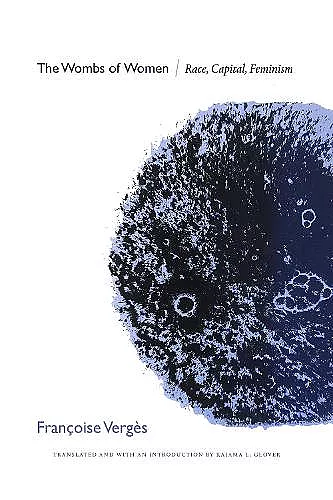The Wombs of Women
Race, Capital, Feminism
Françoise Vergès author Kaiama L Glover translator
Format:Paperback
Publisher:Duke University Press
Published:14th Aug '20
Should be back in stock very soon
This paperback is available in another edition too:
- Hardback£76.00(9781478008521)

In the 1960s thousands of poor women of color on the (post)colonial French island of Reunion had their pregnancies forcefully terminated by white doctors; the doctors operated under the pretext of performing benign surgeries, for which they sought government compensation. When the scandal broke in 1970, the doctors claimed to have been encouraged to perform these abortions by French politicians who sought to curtail reproduction on the island, even though abortion was illegal in France. In The Wombs of Women-first published in French and appearing here in English for the first time-FranÇoise VergÈs traces the long history of colonial state intervention in black women’s wombs during the slave trade and postslavery imperialism as well as in current birth control politics. She examines the women’s liberation movement in France in the 1960s and 1970s, showing that by choosing to ignore the history of the racialization of women’s wombs, French feminists inevitably ended up defending the rights of white women at the expense of women of color. Ultimately, VergÈs demonstrates how the forced abortions on Reunion were manifestations of the legacies of the racialized violence of slavery and colonialism.
“In her wonderful book, FranÇoise VergÈs creates a methodology for teasing out the various strands within which French Republican thought has sustained gender, class, and racial inequality. In doing so, she conceptualizes a new lexicon for postcolonial critique. From the scandal in Reunion to the forms of sovereignty that work within this logic, feminism needs to reconfigure itself if it is to be a force adequate to the future in the face of its previous ignorance. VergÈs’s book takes us there.” - Ranjana Khanna, author of (Algeria Cuts: Women and Representation, 1830 to the Present) "Verges' book… sets itself as an example of what kind of work is necessary to reveal the coloniality of power which persisted after the formal end of colonization. In other words, this book teaches us the kind of work needed to practice a decolonial feminism, a 'killjoy politics', a counterhegemonic strategy which appears fundamental to understand the genesis of femonationalism. There is a particularly valuable contribution made by the book which promises to become one of the most relevant new acquisitions in decolonial and feminist studies." - Erika Bernacchi (Ethnic and Racial Studies) “It is precisely the stories that do not get told in the grand narrative of French republicanism-and, more pointedly, the why of their non-telling-that animates FranÇoise VergÈs’s decolonial, antiracist feminist work, The Wombs of Women (seamlessly translated from the French by Kaiama Glover in supremely engrossing prose).” - Chelsea Stieber (Public Books) "VergÈs's ability to make us focus specifically on colonial and post-colonial France is a feat worthy unto itself and makes this an important contribution to French feminist theory and post-colonial historiography.… An important book for any nation unpacking the not quite extinguished remnants of colonial paternalism.… It should be read alongside more so-called traditional histories of France, to act as a corrective to ongoing narratives of French self-identity." - Robin Mitchell (H-France) "One of the ambitious aims of this book is to spark the development of a decolonial feminism which VergÈs asserts requires delving into the past and rescuing ‘entire periods of history’ (p 115) from oblivion. This book achieves this so well, depicting the urgent need to rethink feminism through a decolonial lens and offers a significant contribution to postcolonial studies." - Natasha Lila Rooney (Postcolonial Studies) "VergÈs makes a powerful case for the geography closest in-here, the womb and its capacity for reproductive futures-as the grounds of any decolonial feminist history worthy of the name." - Antoinette Burton (French Politics, Culture & Society)
ISBN: 9781478009412
Dimensions: unknown
Weight: 272g
184 pages